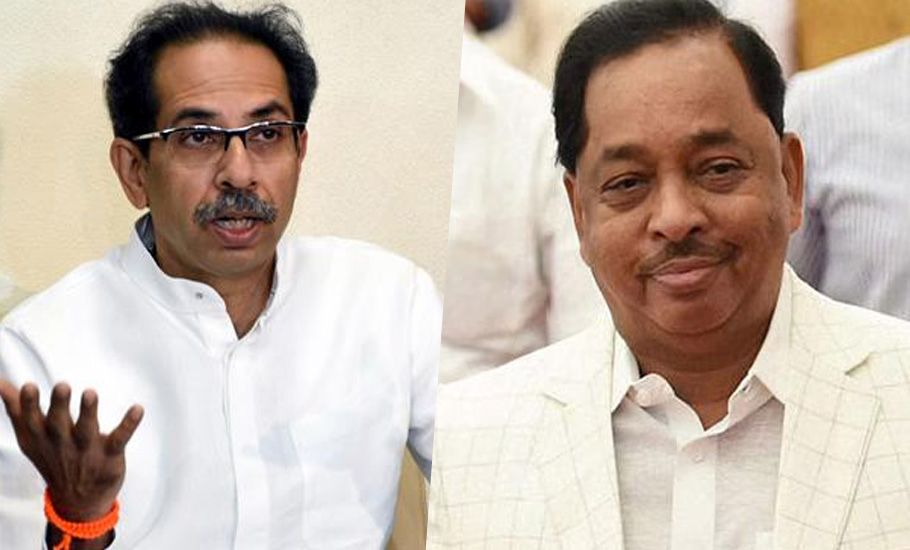
Rane’s ‘slap Uddhav’ remark unparliamentary but charges groundless: Court

A court in Maharashtra’s Raigad has said the “unparliamentary” remark made by Union minister Narayan Rane in 2021 against the then Maharashtra chief minister Uddhav Thackeray was “controversial and politically insensitive” but has found the charges against him “groundless”.
Rane had been charged under IPC Sections 153A(1b) (promoting enmity between different groups), 505(2) statements conducing to public mischief), 504 (intentional insult with intent to provoke breach of the peace), and 506 (criminal intimidation) by Raigad’s Mahad police.
The Chief Judicial Magistrate said the offence did not amount to promoting enmity under provisions of law, as Rane did not target any community. The court, while discharging Rane on Saturday (April 1), also ruled that the material and documents on records did not disclose the existence of all the ingredients of offences against him.
Also read: HC summons to Uddhav Thackeray, Sanjay Raut on defamation plea
At the same time, CJM (Raigad-Alibag) SW Ugale said such a statement was not expected from a person holding the post of Union minister.
2021 case
The case against the BJP leader was registered in 2021. Rane had said, “It is shameful that the chief minister (Uddhav Thackeray) does not know the year of Independence. He leaned back to enquire about the count of years of independence during his speech. Had I been there, I would have given (him) a tight slap.”
He had claimed that Thackeray forgot the year of Independence during his August 15 address to the people of the state. Rane had defended his remarks against Thackeray, saying he did not commit any crime by making the comments.
Thackeray had served as the chief minister of Maharashtra from November 2019 to June 2022.
“Rane allegedly made a statement on the (then) chief minister’s conduct. He didn’t make any statement which was promoting enmity between different groups on the ground of religion, race, place of birth, residence, language, caste or community or any other ground whatsoever,” his lawyer Satish Maneshinde had submitted during the hearing of the discharge application.
Also read: Why Sharad Pawar wants Uddhav to accept new party symbol
Furthermore, the alleged statement was not likely to cause any disharmony or feelings of enmity, hatred or ill-will between religious, racial, language or regional groups or castes or communities, the advocate had argued. The case was politically motivated, Maneshinde had said.
“No reference to any community”
On the charges of promoting enmity between groups and public mischief, the court held that the accused was a political figure with a mass following and was also a Union minister. Being an influential figure in the political arena and having long-standing experience in politics, he very well knew the outcome of his unparliamentary remark against the then CM, the magistrate noted.
According to the prosecution, the words used by the accused were in respect of the then CM, who belonged to a particular political party, which can be understood as a community for the sake of Section 153A or 505(2) of the IPC, and due to the remark made by the accused, there was violence in the society thereafter.
However, the court said there was no reference to any community in the statement made by the accused, which the prosecution was trying to put forth. The relevant Criminal Procedure Code does not allow to presume or assume something to stretch the things to anyhow connect or link the accusation with the accused, it said.
Also read: Rane-Thackeray rivalry is a mesh of old rivalry, revenge, and power games
The very basic requirement to attract the offences punishable under Section 153A and 505(2) of the IPC is missing, the court said.
Charges don’t hold
Rane was also chargesheeted under IPC section 504 (intentional insult with intent to provoke breach of peace). The court said this section mandates that the person insulted by the accused must be aggrieved and provoked to break the public peace or commit an offence.
However, the informant (complainant) has not been insulted by the accused. Therefore, he is not the person who has been insulted and provoked to breach the public peace. Hence, he is not the aggrieved person within the meaning of Section 504 of IPC, the court said.
On criminal intimidation charges, the court said the alleged threat that “If it was me, I would have slapped him” was not a concrete or immediate threat in the form of criminal intimidation.
(With agency inputs)


